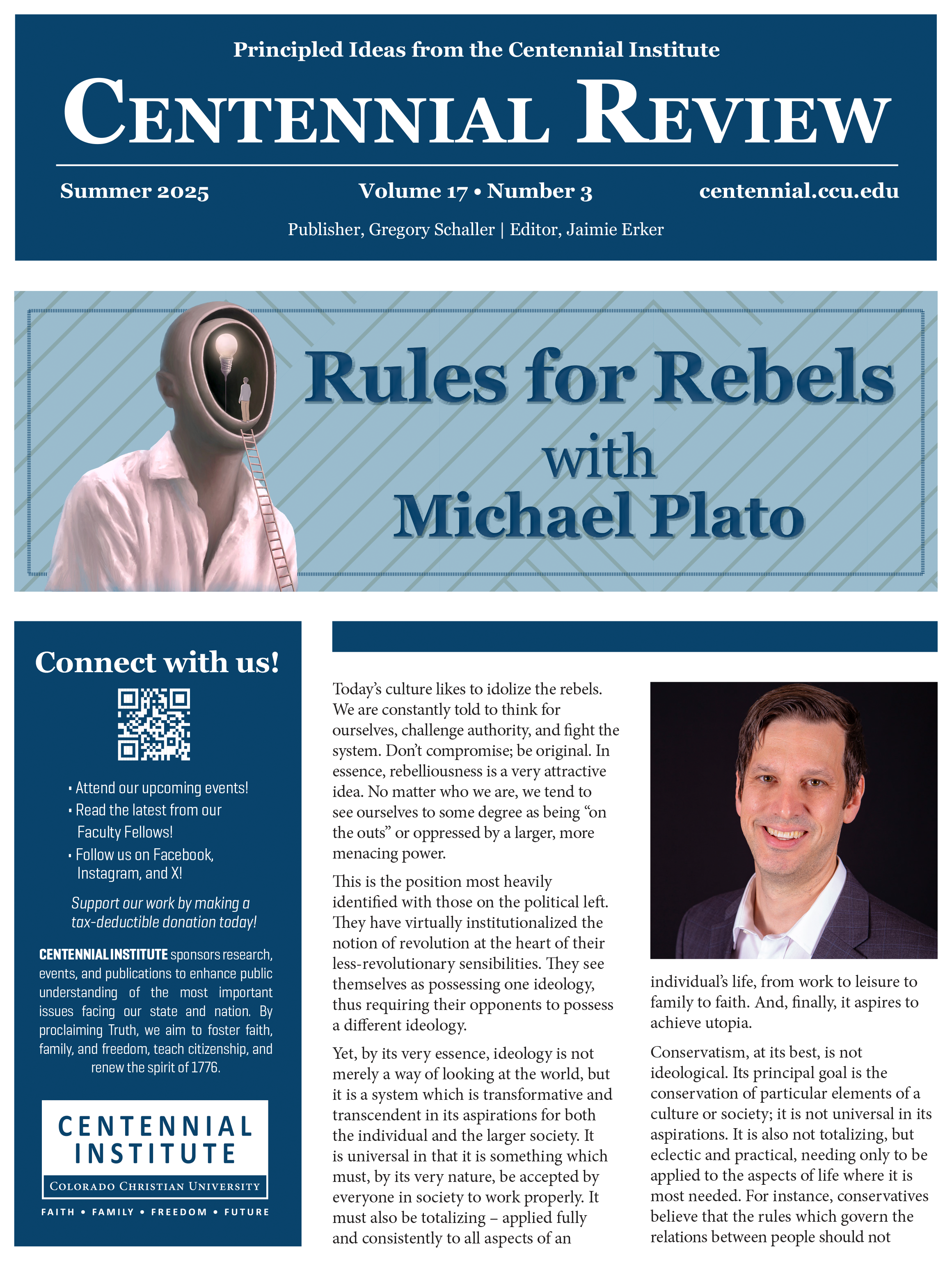
Summer 2025
Rules for Rebels
With Michael Plato, Associate Professor of Philosophy at Colorado Christian University
Today’s culture likes to idolize the rebels. We are constantly told to think for ourselves, challenge authority, and fight the system. Don’t compromise; be original. In essence, rebelliousness is a very attractive idea. No matter who we are, we tend to see ourselves to some degree as being “on the outs” or oppressed by a larger, more menacing power.
This is the position most heavily identified with those on the political left. They have virtually institutionalized the notion of revolution at the heart of their less-revolutionary sensibilities. They see themselves as possessing one ideology, thus requiring their opponents to possess a different ideology.
Yet, by its very essence, ideology is not merely a way of looking at the world, but it is a system which is transformative and transcendent in its aspirations for both the individual and the larger society. It is universal in that it is something which must, by its very nature, be accepted by everyone in society to work properly. It must also be totalizing – applied fully and consistently to all aspects of an individual’s life, from work to leisure to family to faith. And, finally, it aspires to achieve utopia.
Conservatism, at its best, is not ideological. Its principal goal is the conservation of particular elements of a culture or society; it is not universal in its aspirations. It is also not totalizing, but eclectic and practical, needing only to be applied to the aspects of life where it is most needed. For instance, conservatives believe that the rules which govern the relations between people should not be uniform throughout society, but different depending upon the circumstances. How you relate in a family setting should be very different from how you relate to others at church, at work, in government, or out in public. It is also not utopic and transformative, but rather commonsensical and restorative.
Conservatives know too well the dark and sinful ambitions that lie at the heart of every man and woman. They sensibly seek to hold on to the hard-learned lessons from the past. If any group is predisposed to fight the system, it should be conservatives resisting unnecessary change.Therefore, it is safe to say that those on the liberal left are revolutionaries, while those on the conservative right are rebels. What’s the difference? The revolutionary wants to overturn society and replace it with something new. The rebel wants to be left in peace to pursue their private and personal goals.
Yet, as Christians, we also know that the Bible often depicts rebellion in a negative way. We are told that it was Satan and his host of followers who first rebelled against God. Adam and Eve’s sin in the Garden is characterized as rebellion. However, we must also remember that Moses and the Israelites rebelled against Pharaoh and plenty of biblical prophets defiantly condemned kings and empires. Neither of these groups sought a new society; the Israelites wanted to return to their ancestral land and the prophets implored a return to God and His established laws. And, while Jesus Christ told us to render unto Caesar what is Caesar’s, there are many recounted instances where He stood against the authorities.
There is clearly bad rebellion and good rebellion, so how do we fight the system in a good way? The first thing we must do is recognize that there is a system. In fact, we are surrounded by systems. All ideologies are systems of some kind – some more beneficial than others. We must then innovate from the collected and inherited wisdom of our past to seek restoration.
Saul Alinsky was a popular thinker and activist among leftwing radicals in the 1960s and 1970s, famously writing a book entitled Rules for Radicals. Alinsky said that his rules were meant to level the playing field by equipping those without power with strategies to challenge those who did have power and bring about change. In this spirit, I propose a new list of “rules for rebels.” While Alinsky sought to help people who are powerless in their fight against those with power, I am seeking to help people caught, sometimes unknowingly, in systems of change.
My goal is not to level the playing field, but to help people restore their deepest level of humanity. To do so, I will not propose new and innovative ideas but rather the tried-and-true, provided by the best thinkers of the past.
Rule number one: Hesitate. A few years ago, the British philosopher Sir Roger Scruton observed that one of the reasons revolutionary politics are so attractive to many people is because it is so much easier and so much more fun to tear things down than to defend them or build them up. Yet conservatism holds “to the sentiment that good things are easily destroyed but not created.” In a world where we are constantly told that progress and change are not only absolute goods but natural inevitabilities, perhaps the most difficult and defiant thing you can do is resist it.
Sometimes the best thing to do is nothing, especially when the forecast is murky and the proposed change appears to be merely for the sake of change. Perhaps the greatest perceived threat to progress and efficiency is tradition. We are often told that something is a dead tradition; yet, if it were truly dead, why is it still being practiced?
A few years ago, Harvard professor Joseph Henrich studied the traditions of the Tucano, a people of the Colombian Amazon. One tradition of particular interest to Henrich involved the elaborate and time-consuming process of preparing the staple food of manioc, a type of potato.
Manioc contains cyanide, and, over time, its ingestion is fatal. Yet none of the people showed any signs of cyanide poisoning, because the elaborate and ritualistic way in which it was traditionally prepared removed most of the cyanide. Learning the process to remove cyanide on your own would be extremely difficult, and, if this process was rejected because of how labor-intensive it is, it would result in the whole community being poisoned.
Culture is often much smarter than individuals operating over generations, as individuals unconsciously learn from the more successful, prestigious, and healthier members of the community. The process generates cultural adaptations, and many maintain the process because that is how they have always done it. There are moments when we must change or alter traditions, but, when in doubt, it is probably better to hesitate than risk losing something you may never get back.
Rule number two: Be lazy. There is a certain irony within our technologically advanced and prosperous society. On the one hand, we live in a world of luxury and ease compared to those from many generations ago. For example, adult workers in 1870 worked an average of 3000 hours per year; in 2020, this was cut in half to 1500 hours per year. However, according to theorists like Jonathan Crary, this improvement has been countered by several new problems. Crary argues that our economy now operates 24 hours a day, seven days a week. Work and commerce never truly stop, and technological advances such as smartphones, email, and social media have blurred the boundaries between work and rest. We are always connected, always alert, and never fully detached from our obligations.
The modern workday is no longer bound by the 9-5 of the past; people are expected to work late into the night and stay connected. While many proponents of our digital economy suggest that technological advances allow more flexibility in how we work, this has also led to situations where individuals are required to always be available, constantly juggling personal and professional responsibilities.
Presently, the average American adult sleeps 6.5 hours a night. In the 1970s and 1980s, it was closer to eight hours, and, at the beginning of the 20th century, it was nine or even ten hours of sleep per night. Crary argues that this loss of sleep has profound implications, not just for our health but also for our formation as individuals. Sleep is one of the last remaining private spaces in which we can step back from the demands of the world to reflect. When sleep is continually interrupted, so too is the ability to meditate, dream, restore oneself, and to communicate with God. Not only is every moment of our lives increasingly colonized by activity – whether by work or distraction – but our very selves have been drafted into this coercion.
This manipulation of our work lives is completed with annual employee evaluations, performance reviews, professional objective timelines, and even the gamification of tasks. This “self-motivated development” has created one of the biggest problems we face today: burnout. So we employ “cheerleaders” to keep us going. We see this in the proliferation of therapists, life coaches, self-help books, and motivational speakers.
We are a society that does not know how to properly rest – to detach ourselves and take a moment for sheer unapologetic unproductivity. When was the last time you sat still for an extended period without being on your phone or thinking through your future plans? We need to learn how to do this if for no other reason than because it is a biblical mandate. We often forget that the creation week was seven days, not six. The Lord saw rest as something with inherent value and, consequently, demanded that we keep it holy.
Rule number three: Contradict yourself. Despite these concerns with unfettered progressivism and unrelenting productivity, the most pressing crisis of our time is the assault on truth.
This centuries-long attack in the West has led to its current postmodern consequences: Truth is dead, and all knowledge is relative. Philosopher David Shields notes that the irrelevance of truth has led to the weaponization of deconstruction, particularly in the political arena. We no longer engage with an opposing argument, but simply explain it away as supporting an oppressive system or hidden agenda. Some have come to realize the error of their postmodern ways, and now, in a panic, resort to simple fact-checking, for superficial facts are all they have left in terms of truth. How are we to meet the challenge of relativism?
One possible response is to engage with deeper truths which are only present through paradoxes. Christian writer G.K. Chesterton loved paradoxes. In Chesterton’s terms, a paradox is not merely a rhetorical device, but rather a means of accessing a more profound understanding of life. The tension created between the two poles of a paradox is to reveal truths that the mind cannot fully grasp when it is confided to a purely linear or rational framework. To further simplify, a paradox is a statement or concept that, at first glance, appears to be contradictory, but upon further reflection reveals a deeper truth.
Chesterton believed that embracing paradox is essential for genuine Christian life. The suffering and death of Jesus on the cross, for instance, appears to be a defeat. Yet we find joy in His resurrection because it demonstrates Christ’s ultimate victory over sin and death. Chesterton believed this paradox was crucial to understanding how Christians are to live in this world – not as those who avoid pain and hardship, but as those who find joy and hope in the midst of suffering.
There is also the Christian paradox of freedom through obedience. True freedom is found through obedience to God in a world that sees freedom as the absence of constraint. He argued that true freedom comes from submitting oneself to the divine order. By aligning ourselves with God’s will, we find a freedom that transcends the limited freedom offered by the world.
Chesterton saw modern society as overly focused on materialism, secularism, and a reliance on human reason to solve all of life’s problems. Paradoxes serve as a corrective to this mindset. They remind us that the world is not easily explained and that faith requires a willingness to embrace the unknown. They also show that the ordinary nature of human life is extraordinary when seen through the lens of divine grace.
As Christians, we are sometimes called to live in a world of logical contradiction. For it is only in this discombobulated and baffling space that we can gain insight into those deeper truths of ultimate reality and transcendence. In our rebellion against a culture consumed by revolution, you may not find a new and perfect world, but you may at least see more profoundly and live more happily in the world that already exists.

